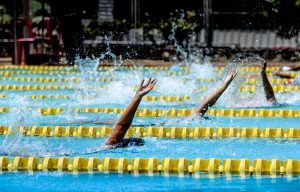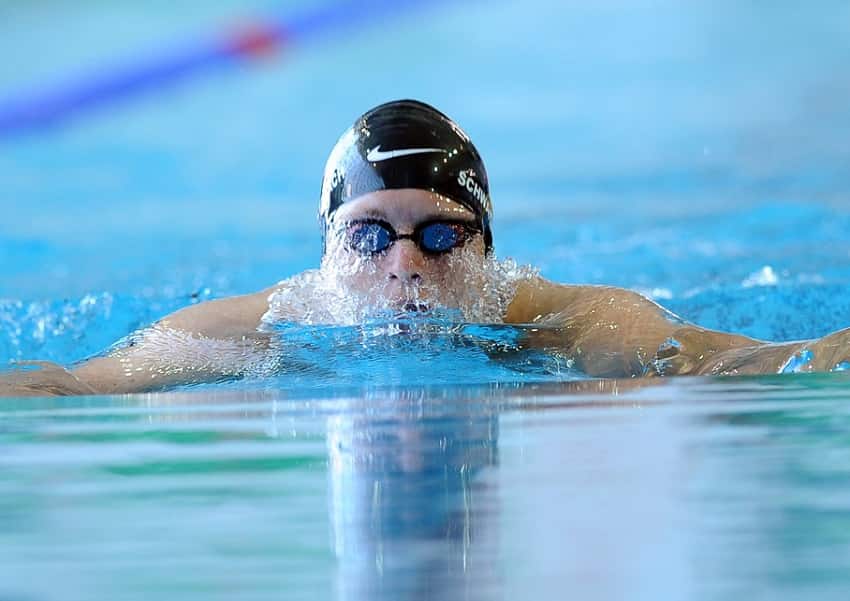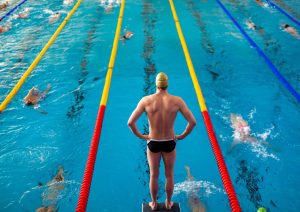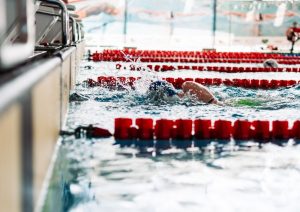
6 Tips for Days When You Really, Really Don’t Feel Like Going to Swim Practice
Going to swim practice feeling like a struggle? Here are some proven strategies and tips to conquer today’s swim practice, even though you might not be feeling it.

Struggling to consistently be confident? Here are three things you can do each day to keep your self-confidence high.
While some swimmers seem to be born with a natural bravado and high levels of confidence, for the rest of us, having the confidence to believe in ourselves and our training can be tricky to maintain over the long term.
As the season of the competitive swimmer is a long one there are going to be the inevitable setbacks and failures along the way…and the corresponding shattering of confidence that comes along with it.
Why our confidence careens off a cliff:
The fragility of our confidence (more so with some swimmers than others) means that it requires daily TLC.
For those who suffer from epic bouts of low self-confidence you should especially be going out of your way to do things that will create a situation when you are more confident in your abilities and in your training.
Doing these things aren’t merely “feel good” or “rah rah”, but meaningful progress that you can truly believe in.
Let’s go:
When our confidence goes it is usually accompanied by thoughts of how far we are far from our goals. The combined lack of progress and frustration leave us feeling uncertain, anxious, and helpless. A prime recipe for low self-confidence.
To get back on track it’s necessary to forget about your goals. Forget the big meet. Forget what you want to achieve this season.
Instead, direct your energy and focus at the things you can do today to be a great swimmer:
When you go to the pool focus exclusively on the thing you want to work on.
These are things you can directly influence, giving you an instant sense of control, helping you to regain some of that lost confidence.
If you are focusing on your long term goals, and how not close you are, anxiety and stress go up, and performance inevitably goes down.
On the other hand, if you think only about what you are doing in the present moment, this lap, this stroke cycle, this 50m of freestyle kick; not only will stress go down, but your effectiveness in practice will go up, and, yup, you guessed it—so will your confidence.
As mentioned, it’s rarely the initial setback that causes the real damage: it’s the days and weeks of poor training that follow that cause us misery. It’s like the swimmer who has a bad race on Friday morning at the bad meet and then swims like crap for the rest of the week.
Getting out of these mini-funks is tough, as when we go spiraling down them everything about the situation reinforces how we are feeling. After all, we beat ourselves up for not being “good enough” and then feel bad about ourselves for feeling that way. Ugh.
The malaise just keeps piling onto itself, and one of the fastest ways is to sneak out via some small wins.
Before heading to your next swim practice figure out three super small wins. These examples will look insanely easy, so easy that you can’t deny trying them. That’s the whole point. Small actions snowball into larger, even more powerful ones, so don’t underestimate their power:
The reason that this works so well is that action is the greatest motivator of all. When in a funk we sit back and wait for motivation or a sign to hit us. But the only way back is to fight the resistance and act.
Low confidence and negative self-talk go hand-in-hand like bad odor and that soggy towel you left under your bed for a week.
Swimmers spend a lot of time in their own heads when training and in competition. From wall to wall we have nothing but the sound of bubbles to accompany the script that is playing in our brains.
And while our self-talk might not seem impactful, it’s basically who is behind the wheel in terms of our effort. The reason is simple: Our thoughts direct our actions.
What we think about and focus on is what we end up doing:
Here are a couple quick ways to reframe two of the more common types of negative self-talk I hear from swimmers (and hear in my own brain during training):
Our confidence can seem like a very fragile thing at times. After all, one bad swim, one bad practice, and we can suddenly end up doubting all of our hard work and training.
While doubt is natural, being crippled by it and losing out on valuable chunks of training and competition because we careen off into another bout of low self-confidence simply doesn’t jive with our long term goals in the pool.
Give the above daily confidence-builders a go the next time you are suiting up to hit the pool.
6 Benefits of Mental Training for Swimmers. Swimming at an elite level requires more than just a great stroke and epic levels of conditioning–it requires a bulletproof mindset.
How to Stay Motivated All Season Long. The key to success isn’t solely setting big goals, it’s about challenging yourself just enough in order to keep yourself motivated and engaged over the long term. Here’s how to find that sweet spot of success.
Subscribe to the YourSwimLog.com newsletter and get tips and advice on how to swim faster every weekday morning, straight to your inbox.
Join 33,000+ swimmers, coaches, and swim parents learning what it takes to swim like a boss.
Unsubscribe anytime. Email will never be shared or sold.

Olivier Poirier-Leroy Olivier Poirier-Leroy is the founder of YourSwimLog.com. He is an author, former national level swimmer, two-time Olympic Trials qualifier, and swim coach.

Going to swim practice feeling like a struggle? Here are some proven strategies and tips to conquer today’s swim practice, even though you might not be feeling it.

Feeling stuck with your journaling? Here are some journaling prompts for swimmers to build self-awareness, confidence, and help swimmers maintain perspective over the course of the swim season.

Swimmers invest a lot of time in the water over the course of the season. The two-a-days, long swim meets, and the perpetual sogginess can be difficult to bear for even the most motivated of swimmers. In the moments when you are struggling with commitment or motivation, it’s a great

Each day at the pool, you have some decisions to make, weighing the trade-offs. Here’s how to choose faster and better swimming.

Motivation or some variation of it is by far the most common query I get from readers of my weekly newsletter. “How do I get motivated to work hard?” “How do I get motivated to do the things necessary for my goals?” “Why is it so hard to get motivated

During my noon-hour swim today, my mind wandered back to my age group days. The swimmers I trained with. The swimmers I raced against. My heroes growing up. And the resulting big box of ribbons and medals collecting dust under my bed. Over the years, I realized, I’d learned a

LANE 6 PUBLISHING © 2012-2024 · PRIVACY POLICY · RETURN POLICY · TERMS OF SERVICE · AFFILIATE DISCLOSURE